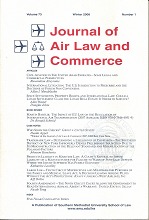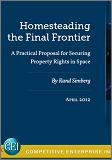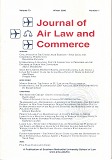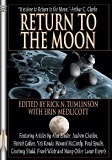PRESS RELEASE: "Space Settlements, Property Rights, and International Law" Published in Air Law Journal
 The article "Space Settlements, Property Rights, and International Law: Could a Lunar Settlement Claim the Lunar Real Estate It Needs to Survive?", which appears in the latest issue of the Journal (Vol. 73, No. 1, published May 5th), could have a significant effect on the future of entrepreneurial space development.
The article "Space Settlements, Property Rights, and International Law: Could a Lunar Settlement Claim the Lunar Real Estate It Needs to Survive?", which appears in the latest issue of the Journal (Vol. 73, No. 1, published May 5th), could have a significant effect on the future of entrepreneurial space development.
Can real estate on the Moon be legally claimed, owned, and resold, without violating international treaties or other laws? A newly published article in the Journal of Air Law & Commerce, the oldest and most respected law journal in its field, indicates that it could - but only by privately owned "space settlements".
The article demonstrates, thorough dozens of expert opinions, legal precedents, historical records, and logic that while nations cannot claim "national sovereignty" in space, a true private settlement on the Moon could claim a reasonable amount of private extraterrestrial land ownership there.
Further, the article goes on to establish that the U.S. would be allowed to recognize a settlement's land claims, and permit the sale of parts of that Lunar real estate to U.S. citizens back on Earth. All other nations could do the same for their citizens, and the same rules would apply for private settlements established on Mars or an asteroid.
It's long been known that the right to sell Lunar real estate would be the only economic incentive that could make a privately funded space program profitable - but there was doubt about whether that would be legal under the accepted international space treaties
Hopefully this article, and the fact that the Journal of Air Law and Commerce published it, will put some of that doubt to rest.
Don't expect to buy a real deed to Lunar land (as opposed to a "novelty" item) any time soon, however. Space Settlements, Property Rights, and International Law makes it clear that the only ones who can claim Lunar land, and sell it to you, are those who have succeeded in establishing a permanent settlement there before they make a claim. That is, the company of men and women who have built real rocket ships, gone to live on the Moon to stay, and offer to sell tickets on the their ships to anyone who wants to visit the Moon and can afford it.
The article takes up all of the possible objections to private property in space and attempts to answer each of them through precedents as varied as the Russian settlement of Alaska, The U.S. Deep Seabed Hard Mineral Resources Act, and the U.S.-Iran Treaty of 1957, historical documents, legal principles, as well as expert opinions from contemporary experts and historical authorities from Seneca to Heinlein.
After 42 pages of detailed arguments and discussion (including over 180 footnotes), the article concludes:
The Outer Space Treaty does not appear to ban private property in space. Nations could recognize land ownership claims made by private space settlements without being guilty of national appropriation or any other violation of the Treaty.
Land claims recognition legislation would, therefore, be perfectly legal under existing international laws.
Such legislation would be the best way to promote privately funded space settlement, and in fact, may be the sine qua non for the expansion of the habitat of humanity beyond the Earth.
The article was researched and written by Alan Wasser and Douglas Jobes, two officials of the Space Settlement Institute, a New York City based think tank "dedicated to finding ways to make Space Settlement actually happen in our lifetimes". Wasser is Chairman of the Institute and Jobes is it's President.
A PDF file of the article, as it appears in the Journal, can be found in the Institute's Research Library or at http://www.space-settlement-institute.org/Articles/jal73-1Wasser.pdf.
The Journal of Air Law and Commerce, published by Southern Methodist University's Dedman Law School, in Dallas, Texas, is the oldest scholarly periodical in the English language devoted primarily to the legal and economic problems affecting aviation and space. It circulates in 54 countries.




